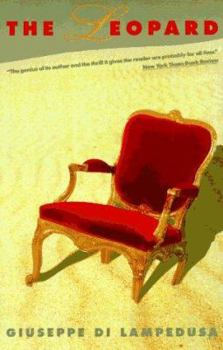The Leopard
Select Format
Select Condition 
Book Overview
SOON TO BE A NETFLIX SERIES - Set in the 1860s, The Leopard tells the spellbinding story of a decadent, dying Sicilian aristocracy threatened by the approaching forces of democracy and revolution. The... This description may be from another edition of this product.
Format:Paperback
Language:English
ISBN:0679731210
ISBN13:9780679731214
Release Date:July 1991
Publisher:Pantheon Books
Length:319 Pages
Weight:0.70 lbs.
Dimensions:0.7" x 5.2" x 8.0"
Customer Reviews
5 ratings
ASTOUNDING AND SUBLIME
Published by Thriftbooks.com User , 16 years ago
Guido Waldman's traslation of Gioacchino Lanza Tomasi's introduction is a boon for the literary scene. Lampedusa's nephew, runs a detailed history of the the novel's publication and more importantly here included are passages Lampedusa wrote for the book that were omitted by the original Italian editors and subsequent English versions. To read Di Lampedusa in Italian is like reading Proust in French, which is to say it is characterized by a melodious dalliance that lulls and swells in dreamscapes of intellectual brilliance. Guido Waldman, whose efforts include the Oxford edition of Ariosto's "Orlando Furioso" (not an enviable task - imagine translating into a collected allegorical prose Spencer's "Faery Queen"), invariably paces the rhythm of the English in a comparable rendition, while attuning the lyricism in delicate cadances. "The Leopard" represents a command of style and a robust poetic affluence that is exceptional. The vigour and audacity of the novel is never compromised throughout its scope and vision, and moreover it is persistently haunted by spectres of an apocalyptic doom loitering lustfully. To read this novel is to witness the expression of a community in distress as it finds itself fidgeting to keep its composure while arrested amidst a stalemate, as it were a cultural limbo. Giuseppe Di Lampedusa fashions a circumventing microcosmic portrait that is nostalgic and entertaining. Episodes of ribaldry abound yet they always steer clear of expressing disrespect for a tradition and a cultural milieu that preserves its ambiguity and its inconsolable propriety. The discomfort of the probing characters is strung and picked so as to strike a melodious ravishment that transgresses all values and disarms the structural apogee of the narrative. In its many particulars, and brusque, yet delicate lyrical tendencies, this novel gives delusional recordings of an island distant and beyond memory. Here we hear the tourbadour's chant nearing with incredulous apathy, both the harmony of a siren song and the discordant twang of a swan song lingering beyond the sheet-music read. It's as if a protracted melancholia overtook a whole culture and a poetic instinct becomes embalmed in its people. Sicilians have a heritage of millions of years which resonates throughout, and apologizing for my not being a Sicilian, I would suggest a visit to Siracusa, Palermo, Catania, or even off the coast to Taranto (Calabria) to remind us that the Odyssey's tales mostly take place in and around this island. Di Lampedusa is a classic man of letters, with an Odyssyan propensity for exploring the whims of human nature and exposing the forces that cross the devide that stands between loyalty and desire. I have found such a high quality of "delightful disturbance" only in a handful of artists - Primaraly in De Chirico's paintings, which parallels astoundingly well alongside any reading of "Il Gattopardo". In literature one may well liken Di Lampedusa to the late Thomas Ma
A Forgotten Classic??
Published by Thriftbooks.com User , 22 years ago
This is a wonderful historical novel/character study/satire of political "progress" that pays homage to Stendhal. Di Lampedusa's Don Fabrizio (based on the author's own great grandfather), Prince of Salina of Sicily, is an unforgettable character - full of himself and his pampered, aristocratic life, wiley and politically astute, lusty, yet loving, compassionate and melancholicly romantic. The history of the Italian Risorgimento is fascinating. It's a shame that this wonderful writer wrote so little before he died.
Rich description, wonderful characters, great writing!
Published by Thriftbooks.com User , 22 years ago
I know little of Italian politics or history, but that didn't keep me from being swept up in the story, whose well-drawn characters inhabited a feudal landscape that was inevitably fading away. Don Fabrizio, a prince in Sicily, is at the peak of his power in 1860, living a life of luxury with his wife and seven children and taking the appeasement of his sensual appetites with other women as a given, despite his wife's tears. But around him swirl the winds of war and change, as Garibaldi's army is sweeping through Sicily and there are changes that challenge his way of life. He resents the upstart commoner who is making a fortune by buying the land and yet still is willing to arrange a match between his nephew and the commoner's beautiful daughter, Angelica. There is a great scene where this marriage arrangement takes place, which is ripe with the subtleties of class.The writing is rich in descriptive texture. I could almost smell the fragrance of the garden and touch the extravagant furnishings of the estates. This sets the stage for the very real people who taste the dust of long carriage rides as well as dress in silk and attend great balls. I learned about the politics of the time, the role of the church and the view of the world as perceived by the privileged few for the fifty-year time span of the book, which concludes in 1910. It was a deeply satisfying read. Highly recommended.
Revolution and resignation
Published by Thriftbooks.com User , 23 years ago
The Leopard is a story of aristocratic decline in an age of revolution and democracy. It is set in Sicily at the time of the Risorgimento in the mid-nineteenth-century that put the Italian states on the path to unification. Don Fabrizio is a Sicilian aristocrat of German extraction. While Sicily is conquered by the nationalist Redshirts under Garibaldi, he spends his time indulging his interest in astronomy and his passion for women. He tends to his estate, Donnafugata, and holds discussions with his tolerant yet gently disapproving priest. In need of money, his nephew marries the daughter of the village mayor, who also happens to be the local mafia chieftan. Don Fabrizio's world is coming to a close. It is the end of aristocracy and the triumph of the grubby merchants, the middle classes, and the democrats -- the triumph, in short, of the vulgar money-making classes and all they represent.Don Fabrizio's attitude to what is happening around him is one of resignation. On a political and social level, this is disappointing. I wish he would spend less time looking through his telescope and more time organising a resistance. After all, isn't the best antidote to revolution - be it political, religious, social, or sexual - not apathy or aloofness, but counter-revolution? Don Fabrizio's political impotence in the face of savagery is symptomatic of the deeper maladies that later came to infect the ruling class of the West in the nineteenth and twentieth centuries. Piety gave way to decadence, virility to effeminacy, loyalty to treason; the biggest tragedy by far was the wholesale loss of confidence. But accepting fate is part of the aristocratic ethos to which a nobleman such as Don Fabrizio would adhere, so perhaps I should not be too hard on him.Like all classic stories, The Leopard transcends its historical setting. In this case Lampedusa wrote the story during WWII while Sicily was overrun by Allied troops. Although partly based on the author's own family history, it can also be seen as his reaction to the occupiers' deliberate destruction of Sicily's ancient palaces and estates, not to mention their corrupting notions of liberty and democracy. The story echoes even more closely our present day situation. As the American republic metamorphoses into a tyrannical global empire, and as the revolutionary processes of globalization and Americanization threaten to obliterate traditional Western civilization, the only things we are left with -- like Don Fabrizio -- are memories of a better, nobler age. The Leopard reminds us that change too often equals decline, especially in the modern era.Similarly beguiling is Lampedusa's short story, The Professor and the Siren. In some ways it is an even more haunting tale than The Leopard. It has certainly stuck in my mind all these years since I first read it. The latter book, though, remains an unadulterated classic and is highly recommended.
A great novel, beautifully written and very moving
Published by Thriftbooks.com User , 24 years ago
I approached The Leopard with high expectations which were thoroughly satisfied. The novel, apparently based on the life of di Lampedusa's great-grandfather, is the story of a proud, sensual, Sicilian aristocrat at the time of Italy's Risorgimento (1860 or thereabouts), and his reaction to the changes he sees in his society: mainly the inevitable, indeed necessary, but still in some ways regrettable displacement of the aristocracy from their traditional position. The title character is a wonderful creation, and the lesser characters about him (his wife and children, his favorite nephew, the Jesuit priest Father Pirrone, and so on), are also very elegantly depicted. The Sicilian countryside, and telling details of social life at that time period, are also fascinating elements of the book. And finally, the prose is wonderful, and this translation seems very good, save for just a couple mild moments of clunkiness.The Leopard is the story of Don Fabrizio, Prince of Salina, at the time of the main action a man in his forties, with several children. He is a sort of benevolent tyrant in his household, a man of a very old family, accustomed to knowing his place and to having those about him know their places. The Prince is also a man of great sensual appetites, careless with his money (though not wasteful or dissolute), politically knowledgeable but completely apolitical in action, and also an amateur astronomer of some note.When the story opens, the Risorgimento is ongoing, but it is clear that it will be ultimately successful, and that the Kingdom of the Two Sicilies will be absorbed into the newly unified, somewhat more democratic, Italy. Don Fabrizio, out of loyalty, is nominally supportive of the old regime, but he realistically stays out of the conflict. His favorite nephew, Tancredi, the penniless but charismatic son of his sister, is an ardent supporter of Garibaldi (leader of the revolution).Several long chapters, separated by months, follow the progress of the Risorgimento at a distance, and more closely follow events which impinge directly on Don Fabrizio's life, yet which reflect the coming societal changes. These include the plebiscite to confirm popular support for the unification of Italy, his nephew Tancredi's love affair and eventual marriage to the daughter of a wealthy but decidedly lower class neighbor, his daughter's reaction to the attentions of a friend of Tancredi's, and Father Pirrone's visit to his home village. Finally, the action jumps forward some decades to the Prince's death, in a very moving and beautiful chapter, then still further forward to the household of his unmarried daughters in their old age.The events of the story tellingly illustrate both the changing face of society and also the nature of Sicilian society in general. At another level, the Prince's aging and death, and his knowledge of his own mortality, echo the senescence of his class. Loving descriptions of the Prince'
Il Gattopardo Mentions in Our Blog

A Historic Cannes-cellation!
Published by Ashly Moore Sheldon • May 13, 2020
The Cannes International Film Festival has been postponed, along with just about everything else! Are we feeling a little bleu about it? Mais, oui! Nonetheless, we can find consolation in les livres. C’est la vie!





